This is part two of our three-part series on Oregon’s passing laws written by our legal correspondent Ray Thomas. Read part one here.
When is it OK to ride side-by-side?
While the law is not entirely clear, it makes no sense to prohibit a driver from merely moving slightly over the double yellow line when the driver can lawfully perform the same maneuver to go around a pothole or a dog in the road.
ORS 814.430 (the Bill of Rights statute) provides that riders who are traveling “at less than the normal speed of traffic using the roadway at that time and place under the existing conditions” must ride “as close as practicable to the right curb or edge of the roadway” except:
(e) When operating a bicycle alongside not more than one other bicycle as long as the bicycles are both being operated within a single lane and in a manner that does not impede the normal and reasonable movement of traffic.
The statute seems to indicate that riders may ride as many abreast as they want so long as no other traffic is impeded. However, once overtaking traffic is slowed, riders must travel no more than two abreast, so long as “the normal and reasonable movement of traffic” is not impeded.
Does this mean that riders on a roadway may ride two abreast even when going slower than overtaking traffic? It seems reasonable that the riders may maintain their side by side position or double paceline so long as overtaking motor vehicle operators are able to safely go around the group.
So, if there is no oncoming traffic, it is a passing zone, and overtaking traffic can easily go around the riders the law seems pretty clear. But what if it occurs in a no passing zone?
Currently some drivers and law enforcement officers argue that a motor vehicle operator may not “pass” persons on bicycles in a “no passing zone”. This mechanistic approach encourages a frustrating gridlock condition in the traffic lanes. The better practice is to interpret the traffic statutes in a way that encourages a fluid and dynamic flow of traffic and allows the natural cooperative attitude of drivers and riders to team up to share the road. Oregon statute supports such a view.
ORS 811.420 states:
-
(1) A person commits the offense of passing in a no passing zone if the person drives a vehicle on the left side of a roadway in a no passing zone that has been established and designated to prohibit such movements by appropriate signs or markings posted on the roadway.
(2) The authority to establish and post no passing zones for purposes of this section is established under ORS 810.120 (Designation of no passing zones).
(3) The provisions of this section do not apply under any of the following circumstances:
-
(a) When a driver turns left into or from an alley, intersection, private road or driveway.
(b) When an obstruction or condition exists making it necessary to drive to the left of the center of the roadway provided that a driver doing so shall yield the right of way to all vehicles traveling in the proper direction upon the unobstructed portion of the roadway within a distance that would constitute an immediate hazard.
The passing zone statute prohibits a person from passing by driving a vehicle “on the left side of a roadway in a no passing zone”. What does it mean to “drive a vehicle on the left side of the roadway in a no passing zone”? Is the statute violated by the driver who merely allows the driver’s side tires to go slightly over the double yellow line to pass a single rider or line of persons on bicycles riding side-by-side? While the law is not entirely clear, it makes no sense to prohibit a driver from merely moving slightly over the double yellow line when the driver can lawfully perform the same maneuver to go around a pothole or a dog in the road. Common sense and the statute support a maneuver allowing motorized and human powered vehicle operators to move around each other and then proceed at their different rates of speed:
The legal bottom line is that presence of people on bicycles in the lane ahead is a “condition” that “exists making it necessary to drive to the left of the center of the roadway.” Thus, while a driver is prohibited from driving “on the left side of the roadway in a no passing zone” by ORS 811.420(1), the exceptions in ORS 811.420(3)(b) allow the driver to “drive to the left of the center of the roadway” for a “condition” that makes it “necessary”. Driving on the “left side of the roadway” suggests a greater intrusion over the center line than to merely move over to “drive to the left of the center of the roadway”. And the narrow width of track of a bicycle allows the driver to safely pass without taking the passing vehicle all the way “on the left side of the roadway”.
Doug Parrow, a Salem-area bicycle advocate and blogger, has researched the legislative history regarding ORS 811.420 and found that Senator Floyd Prozanski very clearly represented the view during the Safe Passing Bill’s hearings that ORS 811.420 allows a motor vehicle operator to cross a double yellow line in order to pass someone on a bicycle, and equated a bicycle to a farm tractor or any other slow moving vehicle.
Of course this interpretation of the language achieves the riders’ desire to maintain speed and safe position on the roadway when being overtaken by drivers. It is frustrating and dangerous for overtaking drivers to follow impatiently or honk the horn when the roadway ahead is clear and it is safe to go around the riders. Drivers need to know that their driver’s side tires will not be vaporized by passing over the double yellow line in order to give safe berth to persons on bicycles. Many unnecessary roadside conflicts would never occur if drivers would willingly move over to pass persons on bicycles safely.

(Photo © J. Maus/BikePortland)
This article is part of our monthly legal series with Portland-based lawyer and bike law expert Ray Thomas of Swanson, Thomas, Coon & Newton. (Disclaimer: STC&N is a BikePortland advertiser and this monthly article is part of our promotional partnership.)



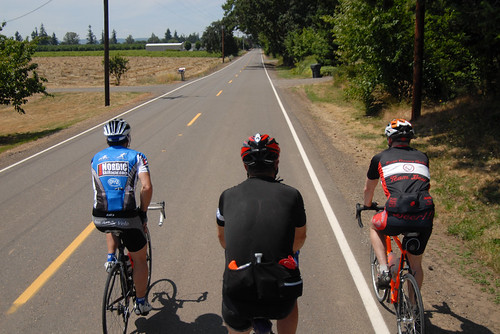
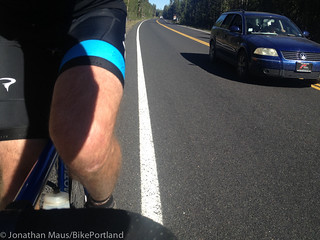
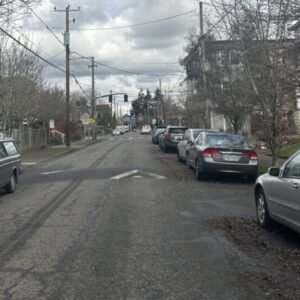
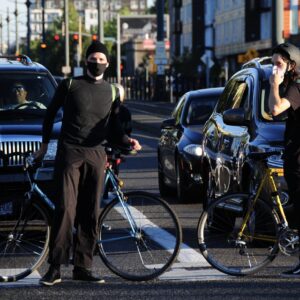
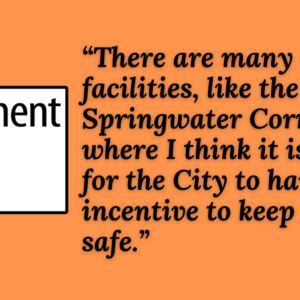
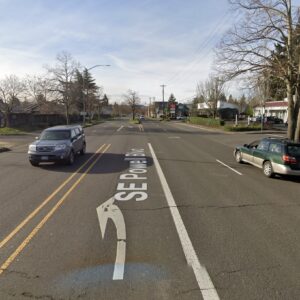
Thanks for reading.
BikePortland has served this community with independent community journalism since 2005. We rely on subscriptions from readers like you to survive. Your financial support is vital in keeping this valuable resource alive and well.
Please subscribe today to strengthen and expand our work.
now how to educate said drivers to chill out and pass safely?
Can you teach ethics and empathy? I’m not sure you can. Some people will only respond to threats and penalties.
Of course you can teach ethics and empathy. Our culture is just doing a terrible job at it.
Thanks for the law lessons. They have been helpful.
On this one I must be reading something incorrectly. To me, “When operating a bicycle alongside not more than one other bicycle”
means you can ride two abreast in this situation. You seem to interpret this as, “riders may ride as many abreast as they want” in that situation. Is there something else that converts “not more than one” to something greater than two? I looked through the linked statutes and didn’t see anything.
There are two separate circumstances being described there.
Say you are riding down a road with two of your friends and there are no cars present, you and your friends are allowed to ride three across in the lane.
However, if a car approaches from the rear, and the group is impeding its path, then the riders are required to move to the right where they could ride either single file or a group of two and one so long as the car is not impeded (i.e. there is enough room for the car to pass).
Does that make sense?
Once cyclists are “taking the lane” anyway, it makes no sense to arbitrarily limit side by side to 2 riders. Limiting to 2 riders makes sense only when sharing shoulder and right portion of the lane with traffic. Washington State seems less restrictive on 2 abreast riding http://apps.leg.wa.gov/RCW/default.aspx?cite=46.61.770 but specifically prohibits more than two abreast. For once the Oregon law seems better on that point. On the other hand, in practice group rides all over Washington take the lane in mass and I’ve never heard of a ticket being issued.
It seems there is some ambiguity caused by missing punctuation. Does the above mean “…alongside not more than one other bicycle–as long as the bicycles are both…within a single lane…”, meaning, “as long as traffic is not impeded and you’re not taking up more than one lane, go ahead and ride not more than two abreast. Otherwise, you’d better single up.”
Or, punctuated as-is, is the interpretation implied in the article, “if traffic would be impeded or you would take up more than one lane, stick to no more than two abreast”, reasonable?
(e) When operating a bicycle alongside not more than one other bicycle as long as the bicycles are both being operated within a single lane and in a manner that does not impede the normal and reasonable movement of traffic.
This to me translates to.
you can ride at a maximum of two abreast as long as you are both in the same lane or if your ride partner is in the cycle lane you can not ride next to him/her in the main traffic lane you must be either both in the cycle lane or both in the main traffic lane.
“The statute seems to indicate that riders may ride as many abreast as they want so long as no other traffic is impeded.”
In PDX there are far more cyclists riding 20 and 25 mph speed *LIMIT* roads than the high speed rural highway depicted above. Moreover, large swathes of portland have signal-enforced speed limits.
Consequently, t seems to me that cyclists often have the right to ride as many abreast as they want <b<regardless of whether other traffic is impeded. Call me “arrogant, but if I am riding near the “normal speed of traffic” I almost always position myself on the far left side of the vehicle lane. This make me more visible to cross traffic and also prevents dangerous “in lane” passes.
Wouldn’t it make sense if we as a community try and “educate” motorist on these motoring intricacies? In just about any other situation if a motorist finds themselves on a single lane road approaching a slow moving tractor or (in the mid west) a horse and cart, road workers, a broken down vehicle or lots of other road users (other than cyclists) situations that cause a lane to be partially obstructed… the motorist will without batting an eye cross the solid yellow (hopefully while slowing down) to give a wide birth and/or “pass” the obstructing vehicle. And yet if its a cyclist they will do everything possible to “get frustrated” and not pass until the cyclist completely clears the road way??
its common courtesy to move over when passing a broken down vehicle that is in the emergency lane… right? Or when a police officer has someone pulled over on the shoulder its not just common courtesy but downright the safest thing to do by moving over while passing.
Why can’t motorist use the same common courtesy for cyclists?
The fact is the percentage of cyclists “not” following the rules and laws is extremely low. which means most (or the majority) of cyclist follow the laws and we cower when a “motorist” brings up the “I see you cyclist breaking laws left and right” argument… I think the best thing we as a community can do is debunk that argument and educate those motorists (in a nice way) that those excuses just don’t work!
Rant off… thanks for reading.
See cyclist. Think horse –
http://www.youtube.com/watch?v=Cl_IzodNazY
Have you seen Oregonians try to parallel park? How about negotiate an intersection with a broken signal?
They’re struggling just to stay on the road. They don’t have the aptitude to learn the finer nuances of driving.
Most drivers don’t know the law, and seem to lose all common sense when bicycles are present. I’ve been stopped at a light in the middle of a right-turn lane (to trip the sensor) waiting to turn right, and had drivers pull up on my right to sneak past me in making a turn. I’ve been stopped at a stop sign in the leftmost 1/3 of the lane signaling a left turn and had drivers pull up in the oncoming lane on my left, stop, then make their own left turn just to get ahead of me (instead of waiting until after the turn and passing normally). I’ve been speeding downhill (taking the full lane) in a 25-mph zone, and had drivers full-on drive in the oncoming lane for a good while to pass me. I’ve been a passenger in a car with a driver who claimed that bicyclists were putting us in a dangerous situation because they were “forcing” us to pass on a blind curve. I reminded the driver that waiting to pass until we could see the road ahead was a viable option–which seemed to come as a shocking surprise. Just about every time I ride to work, at least one oncoming driver will stop short because they see me signaling a left turn and they either a) want to be “nice” or b) seem to think that I must be an idiot and am about to turn in front of them.
Some drivers would be relieved to know that letting their driver’s-side tires touch the double-yellow to safely pass a cyclist is not a crime, others would claim, as you note, that they are never going to “break the law” to pass a cyclist safely, the irony being that if they don’t pass safely, they are still breaking the law–but in their mind, the cyclist is “forcing” them to break the law by passing too closely, therefore it cannot be their fault if they run over such a cyclist. Others claim that if they are in the middle of an unsafe (blind corner or crest-of-hill) passing maneuver and oncoming traffic suddenly “appears out of nowhere”, they are going to err on the side of running over the cyclist–again, being “forced” by the cyclist to do so. This is classic wife-beater mentality: “look what you made me do!! Why do you always have to make me so mad?!”
To me it’s simple: would you (as a driver) do what you are about to do if you were behind a motorcycle–even a slow-moving motorcycle? If not, then don’t do it!
…so basically, when a car does the ol’ “pull waaay over into the left lane and pass at double the speed limit and do not cross back until you are 10 car lengths past the bicycle in order to exaggeratedly show how much of an inconvenience the bike is” move, that’s illegal, but merely juking the car real quick in a fluid move using a relaxed parabola and leaving a couple feet for the biker is totally fine.
I support this, and I wish more cars would pass me using the latter. It is a flow state out there, yeah? I wish more cars would actually pay attention to the NASCAR races they watch and adopt the same flow state ideal. Smooth and not herky-jerky.
Bike’s ahead…
Downshift (decelerate)
Check ahead and mirrors
Find opportune time
Execute
Get a peace sign from the biker…
https://www.youtube.com/watch?v=OAs2PBL1RsA
Don’t forget that on many roads, cars are required to pass at “a distance that is sufficient to prevent contact with the person operating the bicycle if the person were to fall into the driver’s lane of traffic”. I call this about 6 feet. That’s pretty far into the next lane if the bike is not on the shoulder.
Other states clarify it as 3 feet for cars and 4-5 feet for trucks.
All of this is well and good. Still cyclists do block vehicles and deny them passage. I have seen, through Ladds Edition, cyclists chit chatting away and slowly toodling along while 5 cars were lined up behind them.
Share the road works both ways.
“Share the road” doesn’t mean “Get out of my way I’m bigger than you”. If you made the choice to get behind the wheel, you should be able and willing to deal with the fact that there are other people with just as much of a right to use the roadways as you.
The law says bikes can ride double wide “in a manner that does not impede the normal and reasonable movement of traffic.” I’m not referring to motorists who are angry and anxious to enforce their right of weight, (in fact I mentioned that they were lined up behind the cycling chat fest) I am talking about cyclists who impede the normal and reasonable movement of traffic. They are totally out there and they delight in making motorists even more miserable.
and those who feel it their obligation to serve as traffic calming devices, so that house-fraus can’t get to child care on time, I see the self righteous arrogance that justifies anti-bike stereotypes
As an old city bike commuter I’m fine with exercising my legal rights, but I like to share too. Sometimes saying “MINE!” doesn’t feel right, and I’ll move over and motion someone to pass, or signal folks behind me at a stop to pass when the light turns green. It’s good to share, and you make lots more friends in the sandpile.
I agree 100%, if a driver gives the impression they see me as a human being, and I’m on a street without sharrows, I am happy to be a friendly ambassador, and try to do my best to adopt a demeanor that makes people feel like they might enjoy taking their bike, even on a rainy day.
It is only when the driver engages with aggression (or even mild pressure) that I refuse to let them pass. I hope I don’t get squished but I’m talking about the single-file inner Eastside neighborhood streets or sharrowed bikeways, so speed isn’t a big factor.
My feelings about letting friendly drivers pass my on neighborhood greenways is more complicate. For instance, it doesn’t matter how nice you are, I’d rather not breathe your exhaust.
As a “house-frau” who takes her kids to child care by bike, I am very appreciative of any and all traffic calming.
Grandpa, do you acknowledge that just as many cyclists as drivers out there want to get places “on time”. Just because someone chooses to ride a bike to get around doesn’t mean they are consistently on a leisure ride and don’t care about when they get somewhere.
I agree that these two cyclists should have probably moved over. But at the same time, people should expect to run in to bike traffic on Ladd’s. It’s not a major auto throughway.
I totally agree that cyclists have a right to the road, especially for transportation purposes. I absolutely agree that motorists should give cyclists a wide and safe berth when passing. My post regards an episode which I have seen repeated in one form or another many times, where cyclists block traffic either by socializing while blocking other road users, or intentionally blocking motor vehicles because of their conviction that cars are the tool of the devil. FWIW, I was on a bicycle with a cluster of other cyclists behind the queue of cars because it would have been foolish to pass that line either on the right or left. My original post on this issue simply implores riders to share the road. That doesn’t seem outrageous enough to kick up this much dust. Just like bikes are operated by people, cars are operated by human beings and most of them are good folk.
So you don’t think cyclists are ever entitled to ride side by side? Because that’s kind of the vibe your above posts give off.
I agree with you that it is a little rude for two people to ride side by side if they’re holding up 5 cars, but if there are no cars, does a cyclist riding two abreast in the road make a sound?
Sure riders can ride side by side, if it does not impede the normal flow of traffic. Of course riding between Fossil and Service Creek would be delightful rolling along blabbing with a pal. You could hear the Dodge Ram dually coming up behind you and you would drop back, get into single file and let the guy pass. Why would you not? Just like you might say “he can move over easily enough” so too, you can move over easily enough. I have every confidence you could renew the thread of your conversation.
This Bike Portland blog mostly reflects urban riding and the situation is not pastoral. There are lots of road users and it works best if we share. The roadway system is the TRANSPORTATION system. If there is so much traffic that pulling up to chat and dropping back to allow a pass becomes a chore, then perhaps the situation is not right for double wide riding. On the road it is inappropriate to socialize as the priority ahead of transportation. Take the max if you want to move and chat. Sure the roads are public spaces, but they are purpose built to facilitate transportation. Parks, plazas, boardwalks, Multi-use paths are public spaces more conducive to confabulation. I’ll admit that I am pretty hard of hearing, and the ride-and-talk is not easy for me, but still roads are transportation corridors.
What I get out of this thread is a pumping of the Bike vs. Car theme that this very blog rails against when it is printed in the Oregonian or from Joe Rose. The difference here is that bikes are right (ahem). Again, all I’m saying is “share the road”. Peace man.
“On the road it is inappropriate to socialize as the priority ahead of transportation.”
That’s funny. I wonder why they make all the cars so that two people can sit side-by-side. The natural order of things is for there to be only motorcycles and bicycles on our roads because socializing should take a back seat to transportation.
A traffic jam (of cars with people sitting side by side, or even worse empty seats to the right of those piloting the stationary vehicles) upsets the natural order of things, and all those stationary vehicles with empty seats should pull over and let the non-socializing people bicycling breeze on by.
I hear you on the ‘share the road’ thing, man. All I’m saying is the devil’s in the details. There are plenty of ways to misconstrue what the guy on the bike intends to communicate by his lane position, just as there are opportunities to misconstrue what the guy in the car intends to signal with his tailgating and honking.
I’d suggest those bikers are doing a public service by traffic calming / making motoring less convenient.
So do motorists in every city in the nation. At a frequency and duration waaaaaay higher and longer than any group of cyclists could do. Why? Because they want to drive their cars, alone, with 4-8 empty seats, long distances and short, without even considering carpooling, transit, walking, or biking, passing their neighbors’ workplaces and their coworkers’ homes, every day, alongside thousands of their neighbors doing the same thing in the same corridors. This makes them unnecessary, i.e. RECREATIONAL drivers, no matter their destinations.
But when, because of these drivers’ lifestyle choices and recreational car use, cars are jammed and unable to travel at the speed limit, nobody complains about these slow cars with single persons inside deliberately blocking up an entire lane. So why do they complain when TWO people use half a lane?
Haha. Good one. I nominate this for post of the month!
Because motorists are Very Serious People with Important Places to be, duh.
You’re not describing a situation where the driver is being denied passage. They wait until it’s safe to pass.
By taking the lane the bicyclist is forcing the vehicles to move over into the other lane, hopefully giving the bicyclist more room than trying to pass in the same lane without giving the required space. Yes it will make some drivers angry that they have to maneuver around you. But I feel that is better than the driver who thinks they can squeeze by the bicyclist. This is especially true when bicycling down city streets with parked cars.
Bicyclists need to take the lane in urban environments, period. There is no way you can ride to the right safely.
” Drivers need to know that their driver’s side tires will not be vaporized”
Although, maybe if we could get them to think that their passenger side tires might, we could keep cars out of the bicycle lanes.
Being a person who has had extensive experience in commuting by walking, bicycling, bussing, motorcycling, and driving I can honestly say that I have a well-rounded and neutral perspective when it comes to issues such as bicyclist versus motorist.
ORS 814.430 provides that riders who are travelling “at LESS THAN THE NORMAL SPEED OF TRAFFIC using the roadway at that time and place under the existing conditions” MUST ride “as close as practicable to the RIGHT CURB or EDGE OF THE ROADWAY” except:
(e) When operating a bicycle alongside NOT MORE THAN ONE OTHER BICYCLE as long as the bicycles are BOTH being operated WITHIN A SINGLE LANE and in a manner that DOES NOT IMPEDE the normal and reasonable movement of traffic.
This can clearly be interpreted as such: (1) it is understood that bicycles usually travel less than the normal speed of traffic, (2) bicycles MUST ride as far right as possible, (3) the ONLY exception is if a MAXIMUM of TWO bicycles are riding abreast, both operating within A SINGLE LANE, NOT IMPEDING the normal flow of traffic, (4) riding even two abreast on a 2-lane highway, such as pictured, WOULD IMPEDE the normal flow of traffic once cars approached from the rear, (5) this does not give special exception to operate bicycle(s) outside of an existing bike lane for extended periods of time.
The author purports to say that the statute allows bicyclists to ride as many abreast as they want as long as there are no cars immediately behind them, and only then are they required to ride no more than two abreast. The problem is that many bicyclists in Portland interpret that to mean that they can ride as many abreast as they want at all times no matter how many cars are piled up behind them and that they can completely disregard the existence of bike lanes (and stop signs for that matter) in order to ride only as far right as suits their mood.
My stance is that there is little need for any bicyclists to ride even two abreast for an indefinite period of time and that they should, whenever possible, ride single file in anticipation of possibly impeding the normal flow of traffic (and also for their own safety). Furthermore, in areas where there is a clearly marked “BIKE LANE” bicyclists should always be within the lane designated for them except when the need arises to pass a slower bicyclist or to avoid an obstacle and only for as long as it takes to perform the maneuver. You don’t see cars indefinitely cruising the opposite lane in legal passing zones just because it’s legal to cross the dotted line, do you? That being said, when a “BIKE LANE” is present bicyclists may only ride a maximum of two abreast if they are both operating within the “BIKE LANE” and not impeding the normal flow of traffic!
SO… You are basically saying that cyclists should share the road by obeying the law and using common sense. This may not sit well with zealots on the blog who plump with schadenfreude while perpetuating the car vs. bike antipathy.
No, what Universal Commuter is doing is pearl clutching… ‘Many Bicyclists” are scofflaws, and shouldn’t even be afforded their right to ride two abreast, because “many bicyclists” have abused that right.
The same mentality that brought critical mass to rush hour on Friday. Riding in a group wouldn’t be empowering enough if it didn’t make the worst traffic day of the week worse, right? This mentality seems to be impervious to criticism though… I’m sure I’m just pearl clutching or victim blaming. Lol. IMHO some people take their anger in life out on strangers using fairly impotent gestures, and the (usually male) cyclist who insists on becoming a traffic calming obstacle needs to go on a Holiday in Cambodia or something.
Your post is really confusing… are you jumping from two people riding side-by-side on Clinton to Critical Mass on Friday?
I feel you are saying something along the lines of “pedestrians have the right to cross the street where there is no cross walk as long as they are at the end of the block and the sidewalk continues, but they shouldn’t, because I personally deem it unsafe and it holds up traffic.”
Is that accurate? I really don’t see where you’re going with the male bikers and the Dead Kennedys… can you do me a favor and try again with the point you’re trying to make?
So basically you say you understand the laws and then want to just make up your own?
Let’s say a photo like the one above depicts the head end of a double paceline moving at or near a posted speed limit of 25. That means it’s impeding only the *abnormal* flow of traffic — though the scoffing of speed law by traffic is no doubt common, which is not the same as “normal.”
In such a scenario, there would be no legal need for the group to single up — right, Universal (nudge, nudge)?
the next time you drive you should re-examine both the speed *LIMIT* signs that dot our city and your speedometer as you drive in signal-calmed central PDX. a speed limit does not give motorist the right to drive faster than is safe for conditions. and driving at 25 in ladd’s addition is unsafe. motorists should not be doing it and cyclists who ride two a breast at 15 mph are doing the public a service.
Regardless of how far right we ride or singled up its all about drivers understanding to slow up a bit for slower traffic and just share the road 🙂
Most are soo far pent up inside the auto its like a time bomb ticking 🙁
When biking on SW Patton & SW Broadway, I cross the yellow no-pass centerline and pass cars on the left when they are slowing to a crawl (and impeding my normal speed) leading up to the All-Way stops at SW Humphrey, SW Talbot, and SW Vista. Am I breaking the law?
I bet we could put those tire vaporizers to good use in other situations, though!
This law seems reasonably clear. If the highway consists of a single lane in each direction, and if motorized traffic is in both lanes, then the cyclists are required by law to ride: “as close as practicable to the right curb or edge of the roadway”. That means single file on or to the right of the white line. Side by side would be illegal. A single bike “taking the lane” would be illegal.
But if you have done most of the things on the planet that you want to do, and you’ve got good life insurance (if you have a spouse and/or kids), then I’d have no problem if you want to ride any place in the lane that turns your crank; no pun intended.
No, go back and read ORS 814.430 again. Section c:
Which all ads up to that there are many times when a cyclist can “take the lane” BUT that they do need yield the lane to allow overtaking vehicles pass when safe to do so. Also there is ambiguity in the code about the right fog line, but when the shoulder is not a designated bike lane bikes are not necessarily required to ride to the right of the fog line. Generally speaking bicycles are considered vehicles and are expected to operate in the LANE not on the shoulder.
“Generally speaking bicycles are considered vehicles and are expected to operate in the LANE not on the shoulder.”
Not true. It says: “as close as practicable to the right curb or edge of the roadway”. Soooooo, got a 3′ wide paved shoulder? Cops see you riding left of the white line when there is motorized traffic? Ticket. Period. Pay up. Don’t feel bad – the government needs the money.
That’s another area where ORS is not as clear as one might hope. More discussion here and here with mention of people ticketed for riding on the shoulder instead of in the lane.
You need to keep in mind the legal Definition of a roadway according or ORS http://www.oregonlaws.org/ors/801.450
So the shoulder isn’t necessarily included in as far right as practicable. But there is this inherent ambiguity about bikes as vehicles or not. Clearly cars may not normally operate on the shoulder except in special circumstances. However, in application bikes are allowed (even encouraged) to operate on the shoulder. As a matter of actual law however, Cyclists are NOT required to ride on the shoulder except when appropriate to allowed faster traffic to pass.